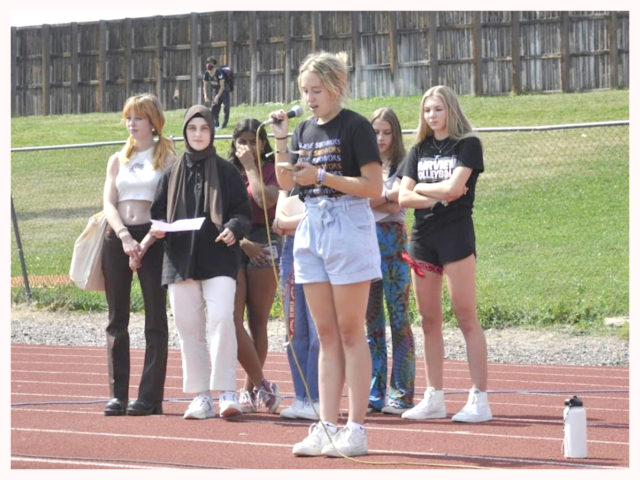
After class on a Thursday afternoon, Annika Spilde orders a latte at Trident Cafe. Wearing a black-and-white checkered skirt, jean jacket and ankle-high black boots, she sits, places her phone face-down on the table, pushes her blonde, middle-parted hair out of her face, and wraps red-polished fingers around her mug.
“I drink a lot of coffee and I’m unashamed to admit it,” the 17-year-old Fairview senior says with a laugh. Every morning, after the sequence of six alarms that she uses to wake up, she drinks a cup, and often takes another in the afternoon; vanilla-cream cold-brews from Starbucks are her favorite, but on cold days like this one, she prefers her lattes hot. For Spilde, the caffeine makes sense: It’s a go-go-go life she lives between high school classes, meetings after school, more meetings on the weekends, and being a Snarfburger- and Winter Park Ski Resort-loving teenager—but the young community activist wouldn’t have it any other way.
On Mondays she meets with Youth Advocating for Change, a pro-LGBTQ+ program sponsored by Boulder County Public Health; every other Wednesday she convenes with Boulder Valley School District’s (BVSD) new Title IX Advisory Council—which Spilde and other students helped create last year after organizing two student walk-outs and a petition demanding more accountability from school administrators regarding sexual violence; and on Sundays, she serves on the Youth Action Board for UpRISE, Colorado’s social justice tobacco control movement.
Sipping her latte, Spilde considers how she began working on such social action and justice projects, especially from such a young age. “I never had one of those cloud-parting aha-moments,” she admits. “I’ve just always been passionate about sexual violence work, and LGBTQ+ advocacy, and substance and tobacco abuse prevention.” And she has the track record to prove it.
Even as a toddler, Spilde’s father, Rich, a lawyer in Boulder, recalls: “Annika was the one who would wiggle out of your arms and want to go explore. She always seemed to want to go see what was out there . . . and what you’re seeing now—Annika being interested and engaged in the process, and trying to motivate and change policies and viewpoints in areas where she feels strongly about—that doesn’t surprise me because it’s actually been going on several years,” Rich says. “She’s tenacious about it.”
In elementary school, for example, when the family lived on Eighth Street, Spilde took it upon herself to create a neighborhood newspaper, The Crazy Eight. Thinking about herself at age seven, peddling a newspaper filled with stories like a nearby telephone pole catching on fire, she laughs and says, “I was always really curious, I wanted to know everything, and I still do—I want to know everything I can.”
A few years later, while attending Summit Middle School, Spilde used her eighth grade capstone project to research the legislative process, then went to testify on a series of bills being heard in the state legislature that year. “I wasn’t very well spoken,” Spilde says, “but I did what I could.”
Afterward she remembers thinking, “This is really cool, it’s something I really care about that I want to continue to do—continue to create change.”
Moving up to Fairview High School, Spilde kept the momentum going. In 2021, her work culminated in a series of public demonstrations that helped pressure BVSD to directly reckon with sexual violence across the school district, and since then, progressive policy changes (like the Title IX Advisory Council) have ensued.
Last year, as a junior, Spilde worked with the national organization Moving to End Sexual Violence (MESA) to create training materials for teachers to better understand “what students need in the moment they’re coming forward with a report [of sexual violence],” Spilde says. Through MESA, Spilde connected with two seniors, Sophie Dellinger and Beatriz Sanchez.
Together the trio created and amplified the Instagram account @bvsd_survivors. Designed as a space for BVSD sexual assault survivors to anonymously share their stories on social media, the account quickly grew into a call for change. “We [collected] so many of these stories—we shouldn’t have that many. Even one is too many,” Spilde says. “We were able to create that outcry among the students and school community when people started realizing, ‘Hey, this isn’t just something that happened to me, it’s happened to everyone.’”
In April 2021, a Fairview student being tried for sexual assault was acquitted. This prompted the three women to organize a walk-out to support BVSD sexual assault survivors and protest sexual violence; they pulled the event together in 48 hours, and hundreds of students showed up. “The trial is the symptom of the rest of the problem,” Spilde explains. “Some people felt like the system had failed them—[we realized] nothing is going to change unless we make it change.”
At the walk-out, students demanded more education about consent and Title IX in addition to more accountability from school administrators. (Title IX, a federal law prohibiting discrimination on the basis of sex, requires schools receiving federal funding to investigate and fix dysfunctional educational environments.)
BVSD and the Fairview administration took note. Two school administrators (Principal Don Stensrud and Dean of Students Nick Lenk) were placed on leave or suspended after allegations of inaction following claims of sexual violence. But as the 2021-22 school year started, Spilde says the student body hadn’t yet seen “real changes” take effect, so frustration mounted. “I remember so many people texting me, being like, ‘Are we doing another walk-out? Are we doing something else?’ I think everyone was angry and wanted to do something and wanted to remind the school and the district that this was still a problem.”
So in September Spilde began organizing another walk-out. Dellinger and Sanchez, having graduated and moved on to college, helped guide Spilde through the logistics from afar. For this demonstration, nearly the entire school poured outside. To the crowd, Spilde said: “Many of us walked out once before. We walked out demanding change and asking for BVSD and Fairview to do more for survivors. We walked out angry that the system had failed us. And this time, we’re angry that not a lot has changed.”
Randy Barber, BVSD’s chief communications officer, says, “The institution immediately heard their voices, but it did take some time for [the response] to take shape.”
In October, BVSD hired its first-ever Title IX Coordinator, Elizabeth Francis, who got the Title IX Advisory Council—designed to “elevate student voices” from various grades and schools across the district—up and running in November. The district has also implemented new health curriculum with a focus on sexual violence prevention, rearranged its website to make information about sexual violence (and how to report it) more accessible, and updated its investigation procedures. Too, Francis now meets with Fairview students for listening sessions every-other week. She says many of these changes were “absolutely” a direct response to the 2021 student outcry Spilde helped organize.
Spilde says many of BVSD’s recent changes have had positive effects, though “victory” is hard to define. “True success is when no one assaults people—what a revolutionary idea, right?”
The fight to end sexual violence is heavy work, she admits, and while she takes plenty of naps to recharge (in addition to her daily coffee doses), Spilde concentrates on the little things to avoid feeling overwhelmed. “At this point, I try to focus on the small wins we’ve been able to achieve,” she says. “I’m just one part of this movement, and so as long as I can keep moving it along and pushing us toward true success, I’m going to call that a victory for me.”














